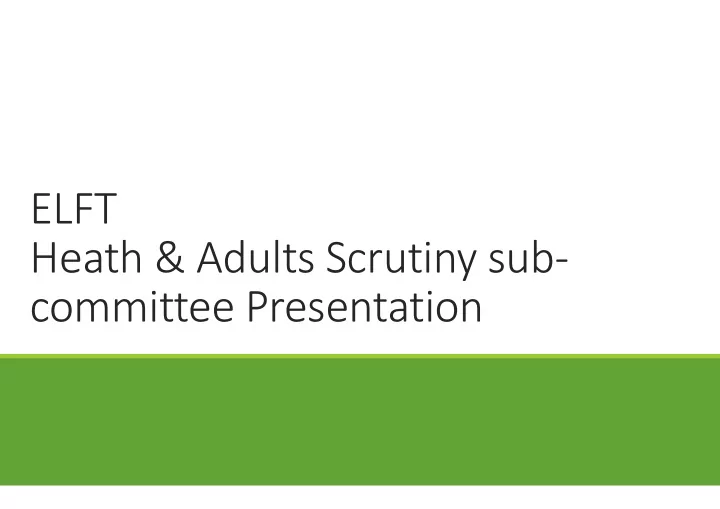

ELFT Heath & Adults Scrutiny sub- committee Presentation
Impact of CoVid-19 on Adults and older adults CoVid – 19 has general exacerbated life stressors at a time when coping mechanisms have also been curtailed or made more difficult to access. Social isolation, job and financial losses, housing insecurity and quality, working in frontline services has been traumatic for many of those workers and reduced access to health and care services. People delayed or avoided getting necessary care and support, and this was indicated in lower referral rates and patients reluctance to engage. Phone and video conferencing has worked well for everyone . People from BAME background, those with an LD and older adults have been affected much more than others. This is still an emerging picture.
Adults: Common mental health conditions � Continue to offer a full range of interventions for common mental health problems and long-term health conditions on virtual platforms and telephone; � Introduced Covid-19 specific psychoeducation classes, webinars and interventions; � Open, quick and easy access to Integrated care pathway for IAPT, counselling, bereavement and employment interventions; � Widely promote the availability of the service and encourage self-referrals; � Sessions with interpreters or bilingual therapists as required; � A temporary drop in referrals in April-May but this has now reversed. July referral rate is currently higher than normal; � Implementing clinical pathways for potential surge in demand for psychological inputs; � Working closely with health, social care and local authority partners, including shielded residents; � Staff psychological resilience – Tower Hamlets Talking Therapies is prioritising NHS and care home staff, who live in TH or has a TH GP; � Starting work on inequalities in utilisation and access to digital interventions.
Adult and Older Adult Mental Health � Adults of working age and older adult community services have run virtual clinics; consultant feedback by phone or video where appropriate. � All known service users were “rag rated” according to risk and contingency planning across teams were implemented to ensure needs were prioritised and met. Staff were flexible and supported other services as demand required. � Face to face appointments have been provided where clinically necessary. Teams have utilised PPE and maintained services throughout the pandemic. Depot clinics have been maintained, Duty systems have been operating to triage and support people. � A Crisis Hub was set up to divert people with mental health conditions away from A&E to reduce the risk of COVID transmission. � The Crisis Line set up an extra line to respond to increased demand and a Crisis Café was set up with Hestia to support people in crisis out of hours and as an alternative to A&E. � The Home treatment Team has operated as normal throughout to prevent hospital admissions � Psychological Therapy services transformed their provision by replacing face to face group therapy with on-line groups � There was a concern that safe hospital bed management would be impacted by an increase in COVID 19 cases. The wards therefore worked closely with the community teams and HTT to safely reduce bed occupancy and support COVID infection control procedures. � Reflective Practice spaces have been made available to all teams to enhance resilience and provide support during these difficult times
Impact of CoVID-19 on CYP and families � CYP with pre-existing mental health difficulties, vulnerable CYP most affected � Unavailability of community services – lack of outdoor activity, overburdened families, increase in safeguarding referrals � School closure - barred academic and social developmental opportunities � Engagement - mixed picture, digital poverty
New “Normal” service � Reduced face to face contacts alongside increase in virtual therapy, considering risk profile, engagement and safeguarding � COVID “recovery” offer by TH Emotional Wellbeing Service in schools during and post lockdown – individual, group and whole school approach � Broadening the front door – triage groups for CYP presenting with anxiety and depression, COVID19 related trauma) � Online group offers - DBT, NVR, NDT � Digital offer - KOOTH, Healios � Primary care liaison offer (e.g. “adholistic” clinic at Spotlight) � Mental health provision for YP in youth justice system – YOT, partnership with St Giles Trust � Comprehensive crisis service – 24 hour crisis line, assertive outreach, interface with inpatient units
Recommend
More recommend